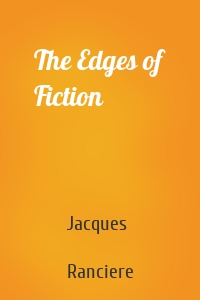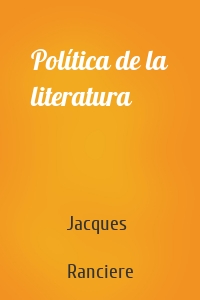Jacques Ranciere
9 кн.
La palabra muda
Jacques Rancière, sin duda uno de los filósofos más relevantes de la actualidad, realiza aquí un recorrido exquisito por la historia de la literatura en el que analiza la naturaleza y las modalidades del cambio de paradigma que destruyó el sistema normativo de las Bellas Letras, al tiempo que se pregunta por las contradicciones y tensiones de la literatura hoy. Rancière propone una nueva interpretación de este cambio, donde la literatura ya no será «ni la idea imprecisa del repertorio de las...
| Автор | Jacques Ranciere |
The Intellectual and His People
Rethinking the role of the radical public intellectual. Following the previous volume of essays by Jacques Rancière from the 1970s, Staging the People: The Proletarian and His Double , this second collection focuses on the ways in which radical philosophers understand the people they profess to speak for. The Intellectual and His People engages in an incisive and original way with current political and cultural issues, including the “discovery” of totalitarianism by the...
| Автор | Jacques Ranciere |
Aisthesis
Rancière’s magnum opus on the aesthetic. Composed in a series of scenes, Aisthesis–Rancière’s definitive statement on the aesthetic–takes its reader from Dresden in 1764 to New York in 1941. Along the way, we view the Belvedere Torso with Winckelmann, accompany Hegel to the museum and Mallarmé to the Folies-Bergère, attend a lecture by Emerson, visit exhibitions in Paris and New York, factories in Berlin, and film sets in Moscow and Hollywood. Rancière uses these sites and events—some famous,...
| Автор | Jacques Ranciere |
Staging the People
Rancière's classic essays from the 1970s, as he was developing his distinctive method. These essays from the 1970s mark the inception of the distinctive project that Jacques Rancière has pursued across forty years, with four interwoven themes: the study of working-class identity, of its philosophical interpretation, of «heretical» knowledge and of the relationship between work and leisure. For the short-lived journal Les Révoltes Logiques , Rancière wrote on subjects ranging across a...
| Автор | Jacques Ranciere |
The Edges of Fiction
What distinguishes fiction from ordinary experience is not a lack of reality but a surfeit of rationality – this was the thesis of Aristotle’s Poetics. The rationality of fiction is that appearances are inverted. Fiction overturns the ordinary course of events that occur one after the other, aiming to show how the unexpected arises, happiness transforms into unhappiness and ignorance into knowledge. In the modern age, argues Rancière, this fictional rationality was developed in new ways. The...
| Автор | Jacques Ranciere |
What Times Are We Living In?
In this short book, Jacques Rancière takes stock of the state of contemporary politics and examines current developments in the light of his writings. Rancière takes issue with what he sees as the consolidation in recent years of an increasingly oligarchic class of professional politicians within the system of representative democracy, while simultaneously objecting to leftist animosity towards electoral politics. He discusses a wide range of contemporary political movements and figures, from...
| Автор | Jacques Ranciere |
La lección de Althusser
"Este libro pretende ser el comentario de la lección de marxismo impartida por Louis Althusser y una reflexión sobre lo que esa lección quiere enseñarnos y sobre lo que de hecho nos enseña: no sobre la teoría de Marx, sino sobre la realidad presente del marxismo; sobre lo que es el discurso de un reconocido filósofo marxista; sobre las condiciones que vuelven enunciable esa lección y que le permiten encontrar un eco: en los intelectuales y en los políticos. No quise escribir una monografía...
| Автор | Jacques Ranciere |
Política de la literatura
En el horizonte contemporáneo, diríase que nada le es ajeno a este impenitente discípulo de la escuela althusseriana: lo ideológico y lo estético constituyen por igual sus genuinos objetos de estudio. Pues lejos del sistema filosófico que pretende reorganizar el universo y de la intervención especializada con una jerga específica, la obra de Jacques Rancière (Algiers, 1940) es un aporte crítico y personal en los más diversos campos de la cultura, sin presupuestos, sin compromisos, sin...
| Автор | Jacques Ranciere |










